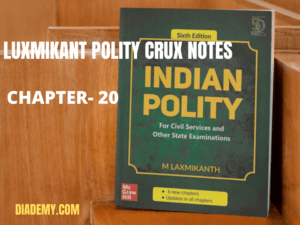
Central Council of Minister
| Article 74 | · There shall be a Council of Ministers with the PM at the head, advise the President, who shall in the exercise of his actions act accordingly.
· POI can ask for reconsideration. · 42nd and 44th CAA – advice binding on President – cannot be enquired by court. |
||||||||||||||
| Article 75 | · PM appointed by President (other minister on advice of PM)
· PM +COM should not be more than 15% of the strength of LS. 91th CA, 2003 · Minister shall hold office during pleasure of President. · COM collectively responsible to LS. · Minister – secrecy oath by POI. · Who not MP is within should take membership. |
||||||||||||||
| Article 77 | Conduct of business of the Govt, All executed action will be taken in name of POI. | ||||||||||||||
| Article 78 | Duties of PM as respects the furnishing of information to the President etc. | ||||||||||||||
| Article 88 | Right to speak and take part in the proceedings of any House, joint sitting but cannot vote.
In 1947 – SC – Even after the dissolution of LS, the COM does not cease to hold office. Again in 1974 – satisfaction of President is not the satisfaction of President, but it is of the COM. |
||||||||||||||
| Appointment Of Ministers | · By President on the advice of PM.
· Person not a member of house – Minister · Should take member within six months. · Minister – not vote but take part in function. · Oath – salary – By President – By Parliament. |
||||||||||||||
| Responsibility Of Ministers | Collective Responsibility
· Art 75, says, i.e. Minister over joint responsible to the LS for their acts of omission & commission and if No-Confidence motion passed – All minister have to realising including (RS). · COM can advise for dissolution the Lok Sabha, as House does not represent the true representation. · Cabinet should support in public the decision.
Individual Responsibility · President can dismiss a COM even the · Councils enjoy majority on the advice of the POI. PM can also ask to resign.
Legal Responsibility · No provision in the Constitution for system of legal responsibility – not required that any order of President be countersigned by minister. · Court barred into enquiring nature of advice. |
||||||||||||||
| Composition Of The Council Of Ministers | 1. PM – defacto ruler
2. Cabinet Minister – Head important ministries like home, defence, external affairs etc. – Attend meeting & play important role in decision making. 3. State Minister – Can be given independent charge or attached to a ministry, to support cabinet minister. 4. Deputy Minister – Attached to cabinet or state only assist them. 5. Parliamentary Secretary – Last Member of COM- Only assist – No parliamentary secretaries have been appointed except during the first phase of Rajiv Gandhi Government. |
||||||||||||||
| Council Of Ministers v. Cabinet |
|
||||||||||||||
| Role Of Cabinet | · Highest decision-making
· Chief policy formulating body · Supreme executive authority · Manage crisis, emergency situations. · Control over higher appointments like constitutional authorities · Foreign policies and foreign affairs. |
||||||||||||||
| Kitchen Cabinet | · Named so during Indira Gandhi era – very powerful government system.
· Small body comprising of Prime Minister +15 to 20 important Minister. · Highest decision making body in formal sense – inner circle – real centre of power · Merits: 1. Small unit therefore efficient. 2. Can meet often – deal with business much more expediently 3. Helps PM maintain secrecy. · Demerits: 1. Reduces authority and status of cabinet. 2. Circumvents the legal procedure – allowing outside persons-influential role in government functioning |
Get all essential Crux notes by clicking here https://diademy.com/product/staticcrux/